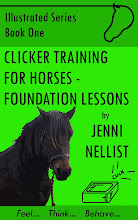Taking a dog for a walk by its lead and leading a horse more or less require the same things: that the animal in question accepts restraint without fear or frustration; and that they go where their human handler goes.
But why would either dog or horse want to do that? The easiest way to frustrate a dog is put it on a lead and deprive it of its liberty to sniff stuff and interact with other dogs. Horses lose thier liberty too, and often the freedom to flee from fear. And that lead (rope) is not only an infringement of liberty, it's an intrument of pain if it's not used with respect - which all to often it isn't.
Fear, frustration and the potential for pain can be very much reduced if the animal is informed about what to do before the lead is even attached. The animal can learn that sticking close and going where the human goes earns food titbits (or ball games for the dog) that can't be got any other way. If they leave the human's side they get nothing. When the animal gets really good at this the lead can be attached. The potential for large and painful pressures is reduced because the animal already knows what to do. Then it is possible to teach the animal that following, instead of fighting, lead preassures is another way to earn positive reinforcement - as well as the pressure release that would obviously entail.
Dogs and horses can be taught to walk nicely on a loose lead, without fear or frustration, and with no resentment.
Friday, 27 February 2009
Saturday, 14 February 2009
Training equine emotions
Do horses really enjoy training? Or do we just like to think they do because we enjoy it?
Horses are always having learning experiences, from every single interaction we have with them. Some of those interactions are really pleasurable for the horse, like feeding for example. Some of those interactions may not be so desirable even if they are for the horses own good, like veterinary interventions!
From an ethical and philosophical stand point I think that horses should be able to enjoy training, after all we are simply usuing them for our own gains. It is only fair that if we do that then we should make it possible for horses to volunteer to be used by us rather than be conscripts into our plans!
It's possible to do that. All the interactions we have with our horses are learning opportunities for the horse, and horses are affected by such conditioning at all levels - not just in their behavioural expression. When horses actively seek or are surprised by rewards (the pleasurable stuff they want ot gain, not just the relief from rein or leg pressure we use to motivate them), they get a release of dopamine. This conditions their brain to seek such rewarding experiences again, and aids their expereince and memory of pleasure. Using rewards in training not only changes their behaviour so that they do more of the stuff we rewarded, it also creates a pleasurable association with the learning environment - including us! This means that not only does the horse perform trained behaviours more willingly, he also seeks us out for more rewarding oppportunities. In other words, he starts to become a volunteer.

I see this phenomenon in real life. Every day I see my own horses it is they who approach me, not the other way around. And when I visit others I've helped I see the same thing happening. Horses have started to catch people!
The same thing has been happening in zoos and laboratories where animals are kept and used for various purposes. Animals that have been trainined to approach and cooperate for positive reinforcement actually volunteer for even potentially painful experiences like blood sampling!
If we're going to enjoy using horses then at least let the horses enjoy it too :-)
Subscribe to:
Comments (Atom)
